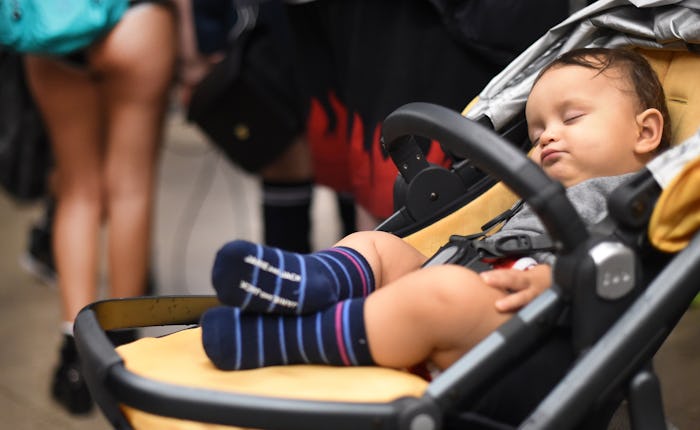Life

Studies About Kids & Lack Of Sleep You Should Read
For many Americans, sleep is the best part of the day. Being able to fade into that dark arena of near-nothingness, the stress and sorrows of the day disappearing behind you. It's pure bliss, for the most part. However, as many adults know, sleep can be an evasive concept, and the effects of its absence are harmful for our health and happiness. Unfortunately, this is also true for kids. As most parents know, kids, especially babies, hardly every sleep all the way through the night, every night. And while this is completely normal, it's still important for you, your sanity, and of course, the health of your child, to try and make sure your kids are getting as much of the recommended amount of sleep as possible. If you're stuck on how to make that happen, here's a list of five studies that show how lack of sleep affects kids.
I get it — you love your kids and want the best for them. But sometimes, the amount of information out there about raising kids can be overwhelming. And let's face it, it's impossible to read everything there is about parenting. Sometimes its easier to just throw your hands in the air and give up. Here's a tip: Don't do that. There's help, if you need it: If sleep is an issue for your family, check out these studies — they may provide a much-needed outlook into what's going on with your kids.
Pathways To Adolescent Health Sleep Regulation & Behavior
This study, published in 2002, shows the effects of a more strictly regulated sleep schedule and a child's behavior. Basically, it proves that sleep deprivation, particularly in children, leads to unstable levels of emotion and attention. Check it out to learn more about the negative side affects of your kid sleeping less (besides you slowly going insane).
Sleep Schedules & Daytime Functioning In Adolescents
Published in 2002 as well, this study looks closely at the relationship between sleep deprivation and a child's ability to think creatively, and function cognitively. The data that's pulled is based on grades, hours of sleep, mood, and more. Read it to prove that you're right, your kid does need to sleep more, and talk to your pediatrician about how best to go about helping them doze off at night.
Understanding Adolescents' Sleep Patterns & School Performance
Published in 2003, this study examines the relationship between children's sleep patterns, and their performance in the classroom. While you may have pulled a couple of all-nighters in college to prep for that final, this study basically says that that probably wasn't the best idea, especially when kids are concerned. Make sure you look at it if you need further convincing that school night bedtimes are crucial and set up a strict schedule — little ones crave structure anyway, and the most important structure you can give them is a good, full night's rest.
Lack Of Sleep Increases A Child’s Risk For Emotional Disorders Later
Conducted in 2016, this study looks primarily at the connection between a lack of sleep in a person at a young age, and their tendency to develop emotional disorders later in life. The study maintains that sleep habits are created early in life, another reason a good night's rest is necessary for your child. Kids still acting out, even on a full sleep cycle? Talk to your doctor about it and get the professional tips and assistance you need.
Functioning & Empathy In Children With Obstructive Sleep Apnea
Okay, so, the title was kind of a mouthful, but basically, this study shows that children may struggle with empathy if they deal with sleep apnea. While you may not be aware that your child has sleep apnea, it's important to get it checked out, even if just a tiny part of you thinks they might. Sleep apnea has a lot of affects on children, so its better to be over-informed, rather than uninformed.
Whatever the case in your household — whether your tots just can't fall asleep at night or the kids refuse to stick to a schedule — the more you educate yourself, the better off you, and everyone else in your family will be.
This article was originally published on